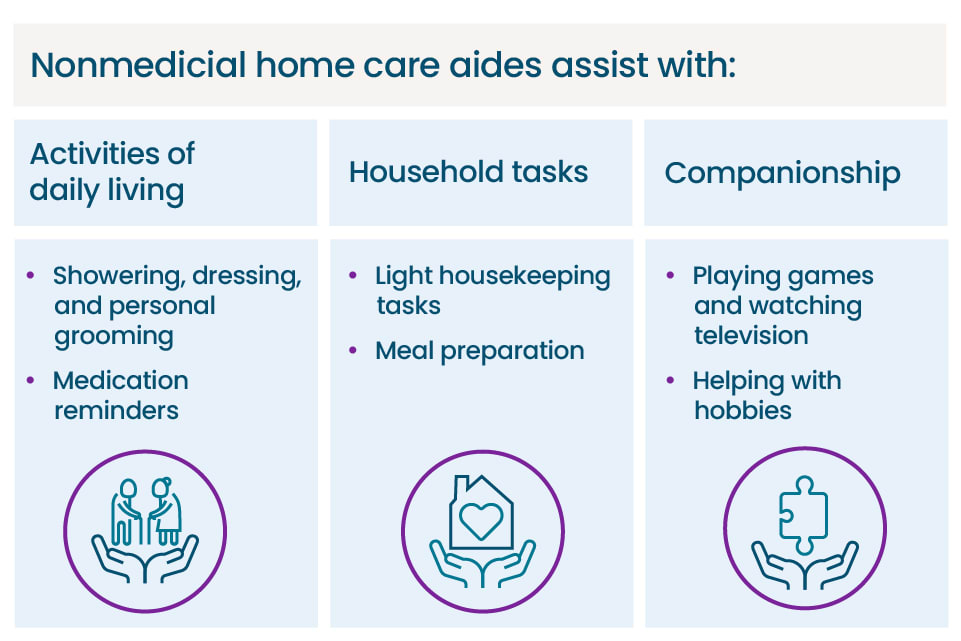What Is Nonmedical Home Care? Services, Costs, and Payment Options

Your loved one may wish to age at home, but they might need extra help with daily activities that have become challenging. Whether your parent requires assistance preparing meals or your spouse can no longer bathe or dress independently, nonmedical in-home care is one option to consider. Nonmedical home care provides personal care for seniors who don’t require long-term medical assistance and want to maintain their independence as they age in place safely. Hiring a care aide can offer you and your loved one support and peace of mind.
Is home care the right fit?
Let our free assessment guide you to the best senior living options, tailored to your needs.
Key Takeaways
- Nonmedical home care offers peace of mind. For aging loved ones who wish to age at home, this type of care can help them do so safely.
- Home care aides help with a variety of tasks. Assistance with activities of daily living, light housekeeping, meal preparation, and transportation are benefits of nonmedical home care.
- Home care is a good choice for seniors who wish to remain independent. If a loved one needs extra help but isn’t ready for residential care, nonmedical home care may be ideal.
- Nonmedical home care isn’t covered by insurance. Most families pay for home care with savings, retirement income, or assistance from relatives.
What services does nonmedical home care offer?
Nonmedical home care is provided by aides with training focused on keeping seniors safe as they age at home. These aides offer personal care, housekeeping, assistance with activities of daily living, and companionship. They do not provide medical care.

Nonmedical home care aides may do any of the following:
- Prepare meals
- Assist with showering, dressing, and personal grooming
- Complete light housekeeping tasks
- Provide transportation
- Offer companionship, like playing games, helping with hobbies, or providing emotional support
- Remind seniors to take medications
- Help with bill paying, appointment scheduling, and communication

Is home care the right fit?
Let our free assessment guide you to the best senior living options, tailored to your needs.
Is nonmedical home care right for your family?
In-home personal care may be a good fit for seniors who are generally independent but need extra assistance with daily tasks and activities.
Consider nonmedical home care if any of the following apply:
- Your loved one is no longer comfortable with or capable of cooking and needs help preparing meals or purchasing groceries to meet their dietary needs
- Your aging relative doesn’t drive anymore and requires reliable transportation to appointments or activities
- Your loved one would benefit from companionship to prevent social isolation
- Your relative is no longer able to dress or bathe independently or needs additional help getting ready for the day
- Household tasks like laundry and light housekeeping have become strenuous
- Your loved one would benefit from reminders to take medications or set appointments
Taking your loved one’s individual needs and interests into account will help you determine if nonmedical home care is the best choice for your family. If you’re an adult child of a senior parent who needs additional assistance, or if you or your spouse would benefit from extra help, ask yourself the following questions to see if home care is a good fit.
- Do you or your loved one wish to age at home for as long as possible?
- Do you or your loved one need significant medical assistance or attention?
- Would you or your loved one benefit from help around the house with tasks that have become more difficult over time?
- Are you or your loved one beginning to feel isolated living at home without regular social interaction?

Home care questions? Get expert help
Tell us your care needs to receive personalized guidance from our advisors.
How can you pay for nonmedical home care?
Since home care isn’t medical, it isn’t covered by most insurance plans. The majority of people pay for nonmedical in-home care using private funds. These may include the following:
- Retirement income or pensions
- Stocks
- Savings
- Home equity
- Assistance from friends or family
While Medicare and Medicaid don’t pay for home care, some other benefits policies might, depending on your loved one’s individual needs.
- Long-term care insurance may provide funds for nonmedical in-home care. These benefits generally begin to apply once a loved one needs help with two or more ADLs, like bathing or dressing. Generally, someone needs to sign up for and begin paying into a policy well in advance, before they require this assistance.
- The U.S. Department of Veterans Affairs may offer programs to help veterans and their families pay for home care. The VA’s Aid and Attendance Benefits and Household Allowance may provide monthly stipends to qualifying recipients. Generally, to qualify, someone must need help with two or more ADLs, be homebound, or have very poor eyesight.
- Private insurance policies don’t generally cover nonmedical home care, but flexible spending accounts can be used to pay for these services.
How much does nonmedical home care cost?
Home care is an alternative to independent or assisted living that allows your relative to remain in their own home. The national median cost of nonmedical home care in the U.S. is $30 an hour, according to a Place for Mom’s 2023 Cost of Long-Term Care and Senior Living report. This cost varies by location, level of care aide education, and services required.
Where can you find nonmedical home care?
If you think home care may be right for you or your aging loved one, the next step is choosing the right home care agency for your needs. A Place for Mom’s Senior Living Advisors can help connect you with local home care agency options and even help set up interviews. Discuss your needs and interests with your advisor, and find the right fit for your family, all at no cost to you.
Home care in all states
The information contained on this page is for informational purposes only and is not intended to constitute medical, legal or financial advice or create a professional relationship between A Place for Mom and the reader. Always seek the advice of your health care provider, attorney or financial advisor with respect to any particular matter, and do not act or refrain from acting on the basis of anything you have read on this site. Links to third-party websites are only for the convenience of the reader; A Place for Mom does not endorse the contents of the third-party sites.
Home Care options tailored to your needs
Home Care options tailored to your needs